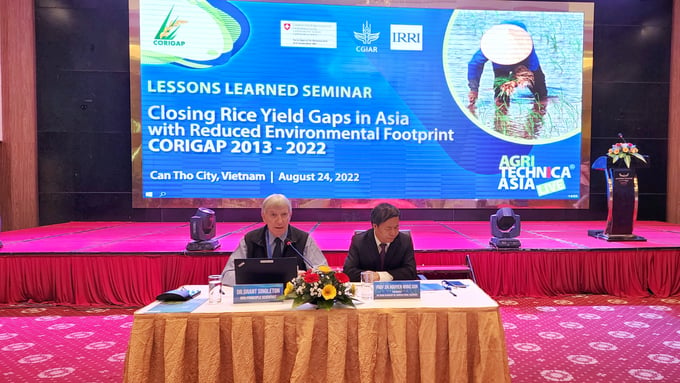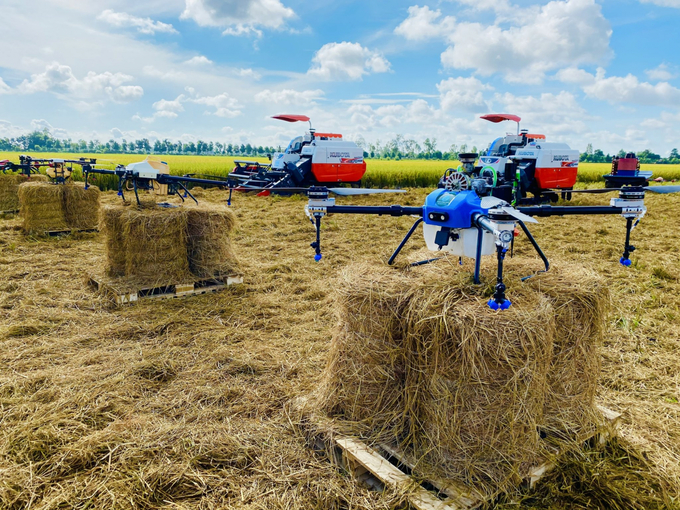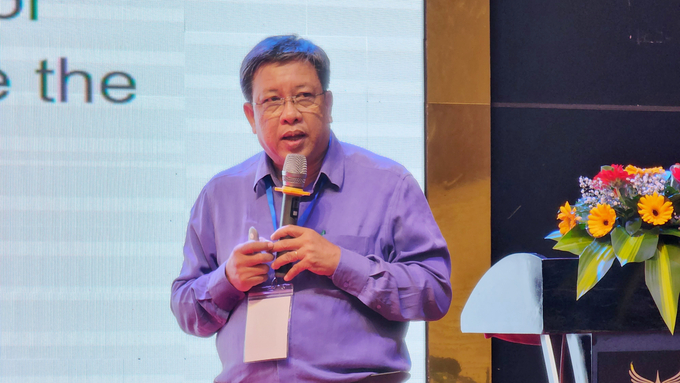November 24, 2025 | 18:30 GMT +7
November 24, 2025 | 18:30 GMT +7
Hotline: 0913.378.918
November 24, 2025 | 18:30 GMT +7
Hotline: 0913.378.918

The conference to summarize 10 years of the project “Closing rice yield gaps in Asia with reduced environmental footprint” (CORIGAP) was held in Can Tho city. Photo: Kim Anh.
Launched in 2013, the project “Closing rice yield gaps in Asia with reduced environmental footprint” (CORIGAP) was an initiative of IRRI with funding from the Swiss Agency for Development and Cooperation (SDC).
The project’s aim was to improve food security, promote gender equality, and reduce poverty by improving the productivity and sustainability of wet rice production systems in six partner countries: Myanmar, Sri Lanka. Lanka, Thailand, Indonesia, China and Vietnam.
Grant Singleton, CORIGAP project coordinator, said that the project’s big success was having a strong impact on sustainable natural resource management in rice production in these countries. An equally important achievement was that farmers have reduced their use of pesticides, seed rates, fertilizers and irrigation water, thus significantly reducing input costs.
During the first phase from 2013 to 2016, the CORIGAP Project developed a sustainable framework for cooperation with partners and national programs. Its content revolved around the issue of best management practices for rice for the benefit of 1,362 groups of farmers or a total of 125,000 farmers on an area of 250,000 ha. At the same time, the project also brought benefits to partners and policymakers.

The application of mechanization in rice production is one of the CORIGAP project’s successes. Photo: Le Hoang Vu.
In the second phase from 2017 to 2021, the project focused on enhancing the capacity of partners in the six countries with the goal of bringing a new approach to working together to help 500 farmers increase productivity and attain sustainable income in 2020. As a result, the increase in farmers’ average income ranged from 15 - 30% thanks to increased productivity and reduced input costs.
And in the final phase, the CORIGAP project opened up opportunities to replicate good management practices in the field of rice production in terms of production, mechanization and post-harvest.
“This project allows us to integrate best management solutions to reduce post-harvest losses, develop and replicate good agricultural practices among farmers and stakeholders in the value chain,” said Martin Gummert, project coordinator from 2020.
Le Thanh Tung, Deputy Director of the Department of Crop Production (Ministry of Agriculture and Rural Development), said that the Mekong Delta was one of the few deltas in the world that produces rice. The region also had very special conditions when production must adapt to climate change while ensuring sustainability and national food security. After 10 years, the CORIGAP project has made great contributions to the region, helping farmers improve production capacity and creating production orientations for localities.

Le Thanh Tung, Deputy Director of the Department of Crop Production affirmed the important role of international organizations in improving rice production capacity in the Mekong Delta. Photo: Kim Anh.
Can Tho city is one of the localities in the Mekong Delta benefiting from the CORIGAP project. According to Pham Thi Minh Hieu, Head of the Can Tho Sub-Department of Plant Protection and Crop Production, the project had contributed to improving the capacity of the city's agricultural sector officials. through demonstration and training models such as SRP, mechanization with the support of IRRI, agricultural extension officers and farmers in Can Tho had made a lot of progress in production and management.
Some mentionable outstanding activities CORIGAP project has carried out in Can Tho city include the support for the development of business and agricultural service models in post-harvest mechanization through funding from the VnSAT Project; demonstration models of transplanters and APV direct sowing machines; establishment of associations to gather knowledge, share experiences and improve farmers' capacity.
Pham Thi Minh Hieu shared some specific figures: since 2018 Can Tho city has had SRP training for 3,000 farmers with a total area of more than 6,300 ha. The city had formed a “big field” model applying the “1 must 5 decrease” procedure on an area of nearly 32,000 ha.
In order to continue to develop the mentioned models after the CORIGAP project ends, Pham Thi Minh Hieu said that the agricultural sector of Can Tho city would continue to expand the “1 must 5 decrease” and SRP models through a number of projects currently invested in the city such as GIZ and the agricultural restructuring project. In addition, the city agriculture sector would replicate models of mechanization, precision sowing to reduce input materials, and applying sustainable straw treatment technology.
Translated by Samuel Pham

(VAN) Dong Thap promotes agricultural restructuring, forms large specialized farming zones, raises the value of agricultural products and develops toward ecological and high-tech directions.
/2025/11/22/4018-4-213342_747.jpg)
(VAN) The Mekong Delta Agricultural Experts Club has attracted 143 experts and researchers to participate in providing consultancy and contributing initiatives to the development of one million hectares of high-quality rice.

(VAN) Ca Mau’s development of OCOP products opens a path to increasing cooperatives value, helping boost income, expand markets, and affirm collective economy's role.

(VAN) Turning seemingly ordinary coconut shells into unique jewelry and artwork, Nguyen Bang Nhi spreads the value of local culture through her brand, Cocohand.

(VAN) Results from the Sustainable Durian Model Project in Dak Lak have confirmed the critical role of Yara Viet Nam in transferring advanced nutritional solutions to farmers.

(VAN) In Tuyen Quang province, livestock farmers have introduced effective models and innovative practices that significantly strengthen African Swine Fever prevention and control efforts.

(VAN) This is the study conducted by IRRI and Can Tho University on the rice straw value chain in Mekong Delta showing an economic potential of more than 6.6 trillion VND/year.